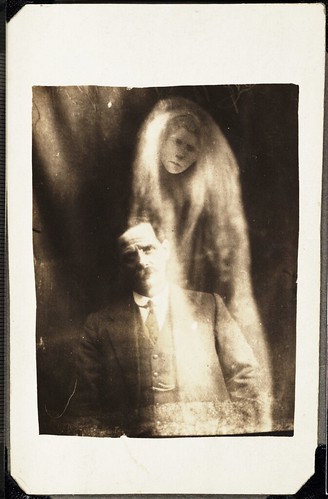Dear Rich: Basically, I do audio collage/sampling all kinds of sources, most of which is free-sharing so it's no problem. However, I have also used source material that I had previously assumed was not copyrghted because none of the CDs had any copyright statements on them whatsoever, so I originally thought "fair game." One of these is a German compilation of Occult recordings (Called "Okkulte Stimmen: Mediale Musik)" put out by suppose). Some are archival recordings from the Society for Psychic Research in England (So does that make it an academic thing that can be cited?) Also, there are recordings of exorcisms from anonymous people as well as chanting by Aleister Crowley. Similarly, I also used so-called "EVP's" or Electronic voice phenomena, which are weird recordings believed to be spirit transmissions (basically garbed stuff recorded between radio stations.) The researchers did this in the 60s and 70s and put out an archival CD called "the Ghost Orchid," again, with no statement of copyright or use. I can't imagine that radio noise could be copyrighted, but what do I know. I know that the Conet Project people got mad at people for sampling their similar stuff that they had recorded off of odd radio transmissions. The same basic rules apply to all sound recordings; the copyright is owned by the (1) person(s) who perform on the sound recording and/or, (2) the person(s) who capture, process, compile and edit the sound recording. In order to become the owner, each of these persons must make a significant contribution, so simply setting up a mike and hitting the "record" button is usually not enough. Because copyright only protects works
created by human authorship the "performers" on most of these recordings -- supernatural, mechanical, or other worldly -- cannot claim ownership. So that generally leaves the party who recorded, edited, and compiled the material as the possible copyright owner. Because many of these recordings were simply a matter of flipping the 'record' button, it's not clear whether such claims to ownership would hold up in court. Adding to the confusion, U.S. protection for sound recordings
began in 1972 and recordings made before that are protected by state laws (as we explained
in a previous entry). As a general rule, the older the recording, the less likely you will have a problem.
The Conet Project. Yes, the owners of the Conet Project
did sue Jeff Tweedy of Wilco for unauthorized use of their spooky recordings. (You can listen to the samples and the resulting
recording here.) The case settled before a court could rule on the copyright ownership of these recordings.
Akin Fernandez isolated and fixed the recordings and claimed copyright ownership. (By the way, since that lawsuit, the Conet Project's label has
become part of the Free Music movement ... although we can't presume that means that copyright has been disavowed as well.)


1 comment:
Thank you much for your input! Part of me wants to believe that Aliester Crowley gave carte blanche permission to all sampling when he said "Do What Thou Wilt". Meantime, I guess I will conduct some seances with a lawyer present.. thanks again, Melanie
Post a Comment